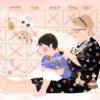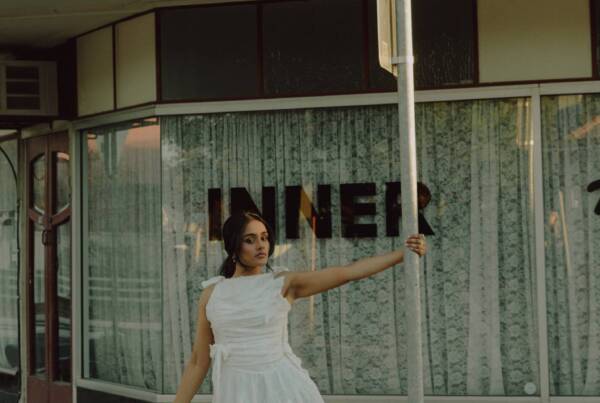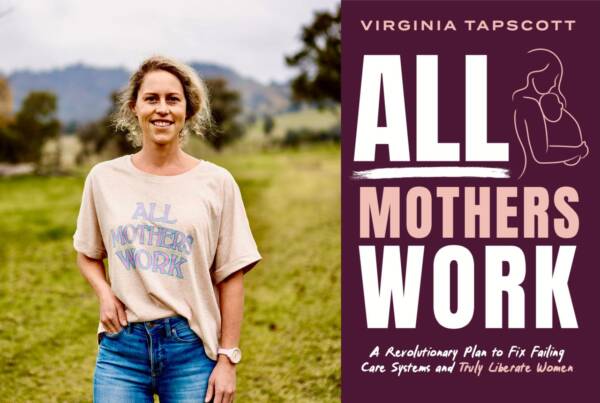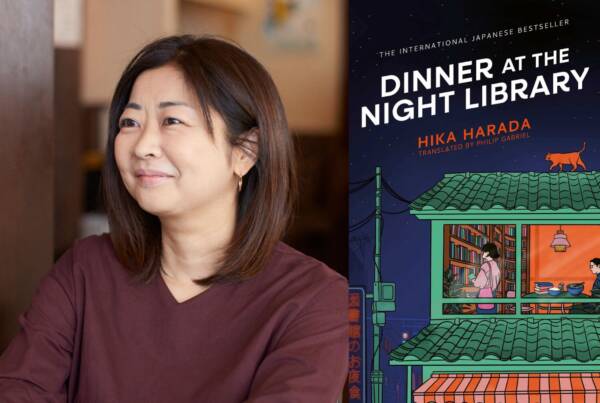Words by Freya Bennett
 The last time I interviewed AURORA, I had my eldest daughter (also named Aurora) with me. Being five and on the precipice of school, she felt incredibly grown up to be included in my work and overcome with an unusual shyness at the kindness AURORA showed – and she still asks about her ‘name sister’.
The last time I interviewed AURORA, I had my eldest daughter (also named Aurora) with me. Being five and on the precipice of school, she felt incredibly grown up to be included in my work and overcome with an unusual shyness at the kindness AURORA showed – and she still asks about her ‘name sister’.
Two years later, I had the privilege of speaking with AURORA again ahead of the Australian leg of her What Happened to the Earth tour. This time, my baby daughter Alba, just eight months old, joined me. Oblivious to the significance of the moment, she insisted we circumnavigate the house during our conversation. I love having my babies with me while I work (where possible) as I think full-time mothers have been kept out of sight for far too long. AURORA was so gracious and loving towards Alba, more than just understanding, she was incredibly encouraging which tells you everything you need to know about the artist’s nature.
As I’m still navigating the chaos of the postpartum phase, I ask AURORA about her ‘postpartum’ stage with the release of her album, What Happened to the Heart, less than three months ago. “We’re synced together!” she laughs, noting that post-release feels “delightful,” “painful,” yet ultimately “beautiful.” She muses that the album now feels like it’s no longer entirely hers. What was once an intimate part of her is now “out there, and people are getting to know it.”
AURORA expresses that she feels “very honoured” by how the world has embraced the album. She is moved that people have genuinely “understood” the depth of what she poured into it. “That’s so touching to me,” she adds.
The album was inspired by a life-changing letter AURORA read in 2022, co-written by Indigenous activists titled We Are The Earth. The letter called for a revolution and spoke of a deep connection to the land “through our hearts” describing the earth as “the heart that pulsates within us.” This led AURORA to question, “What happened to the heart?” Her album takes listeners on an introspective journey from self-destruction to self-healing, ultimately arriving at what she describes as “the truth.”
From an outside perspective, the album is a stunning exploration of the range of emotions we experience as we navigate life on this earth—witnessing its destruction, our own destruction, and ultimately finding our way back to a place of peace.
The musicality is, as always, exquisite, with AURORA pouring her soul into every note. Her voice is ethereal yet powerful, soft yet magnificent, showcasing the strength that lies in gentleness—a poignant reminder of how we should treat the earth, ourselves, and others. The gentler we are, the more space we allow for growth and the more power we give back. That’s not to say there aren’t loud, emotionally charged elements, but to me, the power is in the softness.
AURORA describes the cathartic process of creating this album, admitting, “I cried a lot.” Though she is, by nature, “very optimistic,” she acknowledges that this optimism can sometimes lead her to be “very unrealistic.” For this album, she was determined to ensure her perspective on the future and the world wasn’t naïve but grounded in reality. To achieve this, she had to access a “dark place” and put on her “honesty glasses,” allowing her to see people and life in the way she “needed to” to create an album that truly gets to the heart of the matter.
Reflecting on the unique power of music, AURORA shares: “Music can tell people things in a way that a mother can. Not a teacher, or a preacher, from above and down but right there next to you, just like a mother.” She believes that “this motherly energy is what I think the world needs” adding that, “we haven’t listened to our mothers for years.” I can’t help but agree with this sentiment.
I ask AURORA if she hopes we can find a path to healing amidst the current chaos of the world, she responds, “The world is always chaos because humans are chaos; it’s in our nature.” She reflects on how balanced chaos can be both “enjoyable” and “beautiful.” but today we’re overwhelmed by the sheer volume of horrific events we see through our tiny screens, which we just weren’t exposed to in the past. “We have all the information in our phones,” AURORA says, noting how this constant exposure can desensitise us to suffering.
I ask her thoughts on how we might recover from our current state, and she reflects on how capitalism has “taught us to be so comfortable in the things that we benefit from,” and how “it’s going to be hard, almost impossible I think, for people to give up their comfort to lift up other people.” She expresses how truly frightening it is because people don’t have to be “evil” to contribute to the problem; we’re just human. We’ve been conditioned to expect certain comforts, which she finds deeply unfair but it’s challenging to be angry at “people being people” and difficult to be “activists against ourselves.”
AURORA highlights spiritual loss as a pressing issue in our world today. “We are being more and more chained to these ways of living,” she says, referring to our growing dependence on screens that offer little true value. “Something really deep and spiritual in the world has been lost.” She continues, lamenting how our disregard for nature has led to its destruction: “We really don’t value nature because we’re killing nature.”
While I agree wholeheartedly with our addiction to phones and disregard for nature, I admit to my own screen addiction to which AURORA laughs, “I’m also right there in hell with you, baby.”
“Our phones are making us extremely unhappy,” she continues sharing that she’s “very scared about what it’s going to do to young people.” She emphasises how technology shifts our values from what we are capable of to what we look like—a pursuit she calls “such a waste of time.”
AURORA laughs, saying, “We are so good at stealing happiness from ourselves,” before urging us to “do some work, to be a bit mindful.” She reminds us to be aware of what’s happening around us and the people on the street rather than what’s on our phones, adding with a laugh, “You can smile to them, right?”
She notes that while it might seem like we’re connecting with others online, we’re often just forming deeper ties with our phones. She reflects on how we used to plan gatherings and believes it’s crucial to return to those traditions—like inviting others to “come and dance, come around the fire.” AURORA stresses, “I think it’s important that we keep doing these small things and hope people will show up,” which naturally leads to a discussion about concerts, as they “inspire connection in a real way.”
When I ask AURORA about her upcoming trip to Australia, thanking her for returning so soon, she beams with excitement. “I’ve been missing Australia so much!” she exclaims. “I cannot wait, I love being in Australia,” she adds, explaining that the country makes her feel “unbothered, so normal, so free,” and yet, when she performs, “You go to the shows and feel so loved.” She also expresses her respect for the Traditional Owners sharing, “I have a very big admiration and respect toward the Indigenous peoples in Australia; I align with a lot of their ways.” Reflecting on their resilience despite historical pain, AURORA notes that her environmental advocacy simply echoes what Indigenous Peoples have been advocating for generations: “It’s not new.”
Of course, AURORA touches on our infamously dangerous wildlife, but unlike most, she embraces the fact that we live surrounded by “natural enemies,” appreciating the unique dynamic it creates. “It’s a dynamic between people and animals that the rest of the world isn’t so used to,” she notes with a smile.
As we wrap up our conversation, I show her the giant, flowering wattle tree outside my window, it’s fluro yellow bringing me a daily joy that I know AURORA will appreciate, “It’s like the sun rising up on earth!” she exclaims.
I tell her my excitement to see her in concert in February and that I will be bringing my daughter, Aurora. My heart beams when she expresses her enjoyment of our chats that include my daughters, “It makes me very happy when people like you become mothers,” she shares.
I feel incredibly lucky that I was able to interview AURORA just two years after our first chat. Her music, her advocacy and her sense of humour make her one of my favourite artists of all time and I can’t wait to experience her magic in person next February.
Having sold out two shows already, don’t wait to grab your tickets to experience AURORA’s enchantment.







